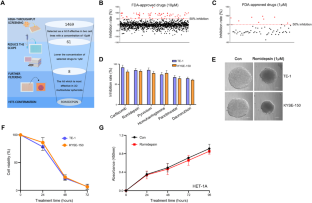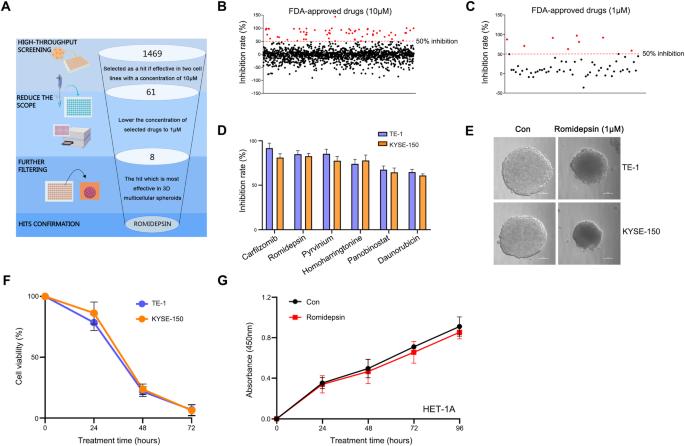Romidepsin exhibits anti-esophageal squamous cell carcinoma activity through the DDIT4-mTORC1 pathway
IF 4.8
3区 医学
Q1 BIOTECHNOLOGY & APPLIED MICROBIOLOGY
引用次数: 0
Abstract
Esophageal squamous cell carcinoma (ESCC) is one of the most common human malignancies worldwide and is associated with high morbidity and mortality. Current treatment options are limited, highlighting the need for development of novel effective agents. Here, a high-throughput drug screening (HTS) was performed using ESCC cell lines in both two- and three-dimensional culture systems to screen compounds that have anti-ESCC activity. Our screen identified romidepsin, a histone deactylase inhibitor, as a potential anti-ESCC agent. Romidepsin treatment decreased cell viability, induced apoptosis and cell cycle arrest in ESCC cell lines, and these findings were confirmed in ESCC cell line-derived xenografted (CDX) mouse models. Mechanically, romidepsin induced transcriptional upregulation of DNA damage-inducible transcript 4 (DDIT4) gene by histone hyperacetylation at its promoter region, leading to the inhibition of mammalian target of rapamycin complex 1 (mTORC1) pathway. Furthermore, romidepsin exhibited better efficacy and safety compared to the conventional therapeutic drugs in ESCC patient-derived xenografted (PDX) mouse models. These data indicate that romidepsin may be a novel option for anti-ESCC therapy.


罗米地辛通过 DDIT4-mTORC1 通路显示抗食管鳞状细胞癌活性
食管鳞状细胞癌(ESCC)是全球最常见的人类恶性肿瘤之一,发病率和死亡率都很高。目前的治疗方案有限,因此需要开发新的有效药物。在此,我们使用 ESCC 细胞系在二维和三维培养系统中进行了高通量药物筛选 (HTS),以筛选出具有抗 ESCC 活性的化合物。通过筛选,我们发现组蛋白去乙酰化酶抑制剂 Romidepsin 是一种潜在的抗 ESCC 药物。罗米地辛能降低 ESCC 细胞系的细胞活力,诱导细胞凋亡和细胞周期停滞,这些发现在 ESCC 细胞系衍生的异种移植(CDX)小鼠模型中得到了证实。从机理上讲,罗米地平通过组蛋白在启动子区域的超乙酰化诱导DNA损伤诱导转录本4(DDIT4)基因转录上调,从而抑制哺乳动物雷帕霉素靶复合物1(mTORC1)通路。此外,在 ESCC 患者异种移植(PDX)小鼠模型中,与传统治疗药物相比,romidepsin 表现出更好的疗效和安全性。这些数据表明,romidepsin 可能是抗 ESCC 治疗的一种新选择。
本文章由计算机程序翻译,如有差异,请以英文原文为准。
求助全文
约1分钟内获得全文
求助全文
来源期刊

Cancer gene therapy
医学-生物工程与应用微生物
CiteScore
10.20
自引率
0.00%
发文量
150
审稿时长
4-8 weeks
期刊介绍:
Cancer Gene Therapy is the essential gene and cellular therapy resource for cancer researchers and clinicians, keeping readers up to date with the latest developments in gene and cellular therapies for cancer. The journal publishes original laboratory and clinical research papers, case reports and review articles. Publication topics include RNAi approaches, drug resistance, hematopoietic progenitor cell gene transfer, cancer stem cells, cellular therapies, homologous recombination, ribozyme technology, antisense technology, tumor immunotherapy and tumor suppressors, translational research, cancer therapy, gene delivery systems (viral and non-viral), anti-gene therapy (antisense, siRNA & ribozymes), apoptosis; mechanisms and therapies, vaccine development, immunology and immunotherapy, DNA synthesis and repair.
Cancer Gene Therapy publishes the results of laboratory investigations, preclinical studies, and clinical trials in the field of gene transfer/gene therapy and cellular therapies as applied to cancer research. Types of articles published include original research articles; case reports; brief communications; review articles in the main fields of drug resistance/sensitivity, gene therapy, cellular therapy, tumor suppressor and anti-oncogene therapy, cytokine/tumor immunotherapy, etc.; industry perspectives; and letters to the editor.
 求助内容:
求助内容: 应助结果提醒方式:
应助结果提醒方式:


